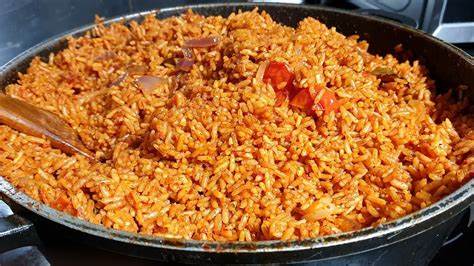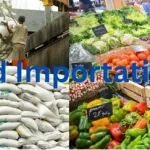In Nigeria, the average cost of cooking a pot of jollof rice for a family of five has increased from ₦21,300 in September 2024 to ₦25,486 as of March 2025, a nearly 20 per cent increase in just six months.
SBM Intelligence recently released a report titled “Staple Under Stress,” which highlights this increase.
Join our WhatsApp ChannelThe report is a component of the group’s quarterly Jollof Index, which uses the cost of producing the well-known West African dish as a stand-in for tracking trends in food prices across the country.
According to the report, the sharp increase is due to the rapidly rising costs of essential ingredients, including rice, pepper, onions, beef, and most importantly, turkey, which is currently one of the most costly parts of the meal.
“Turkey now costs between N8,000 and N10,500 per kilo, a big jump from the N1,500 to N1,700 it cost back in 2016,” the report stated.
The Jollof Rice Index survey was done in major markets across 13 locations in Nigeria between the last quarter of 2024 and the first quarter of 2025. It revealed that while some areas experienced brief price stability at the end of 2024, food costs began to climb again early this year.
The cost of cooking a pot of Jollof rice in Nigeria has been rising due to several economic factors, including inflation, currency depreciation, and supply chain disruptions.
SBM Intelligence mentioned fuel and electricity costs, which have continued to rise.
Nigeria’s rising food inflation burden is highlighted by the 19.7% increase in the country’s average price of jollof rice, which affects not only household budgets but also access to staple foods and nutrition.
Rising Food Prices
Nigeria’s inflation rate has remained high, with food inflation being a major driver. According to the Consumer Price Index (CPI) report released recently by the National Bureau of Statistics (NBS), while the headline inflation rose to 24.23 per cent in March 2025, food inflation was 21.79 per cent on a year-on-year basis.
Exchange Rate Volatility
The depreciation of the naira against the dollar has made imported food items (like rice and vegetable oil) more expensive. Since Nigeria still relies on rice imports despite local production efforts, exchange rate fluctuations directly impact prices.
Fuel and Transportation Costs
The removal of fuel subsidies in 2023 led to a sharp increase in petrol prices, raising transportation and production costs. This affects the price of farm produce, cooking gas (for preparation), and overall logistics.
Supply Chain Disruptions
Middlemen and hoarding: Some traders hoard goods to sell at higher prices.
Insecurity in farming regions: Banditry and conflicts in northern Nigeria (a major food-producing region) disrupt farming and supply routes. SBM Intelligence equally blamed the surge in cost of cooking a pot of jollof rice on insecurity in farming areas of the country.
READ ALSO: Food Inflation In Nigeria Drops To 23.51%, But Prices Remain High
“Insecurity remains a pressing issue, with incidents such as the killing of farmers in Benue, Borno, and Plateau States disrupting agricultural output and reducing the availability of food,” the report stated.
Cost of Cooking Fuel (Gas, Kerosene, Charcoal)
The price of cooking gas (LPG) has risen significantly, making it more expensive to prepare meals. Many households now spend more on fuel than on the food itself.
Previously, cooking a standard pot of Jollof rice (for a family of 5–6 people) might have cost around ₦5,000–₦7,000. A previous SBM Intelligence report showed that the cost of preparing a pot of Jollof rice rose to ₦10,882 as of March 2023.
Victor Ezeja is a passionate journalist with seven years of experience writing on economy, politics and energy. He holds a Master's degree in Mass Communication.















![Trump, Zelenskyy Discuss Peace Plans During Pope Francis’ Funeral In Rome [VIDEO]](https://www.primebusiness.africa/wp-content/uploads/2025/04/Trump-and-Zelenksy-meet-at-Pope-Francis-Burial-150x150.jpeg)


